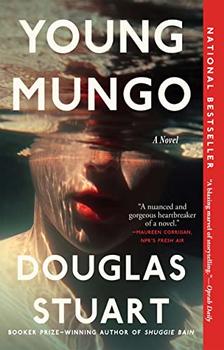Summary | Excerpt | Reading Guide | Reviews | Beyond the Book | Read-Alikes | Genres & Themes | Author Bio

This article relates to Young Mungo
 One theme of Douglas Stuart's Young Mungo is the quotidian experience of violence. In part, this violence comes from warring sectarian gangs, whose vicious rivalry wreaks havoc in Glasgow's East End. Enmity between Protestants and Catholics has a long history in Glasgow, as well as Scotland more generally. It can be traced back to the 17th century and, while no longer as prevalent as it was in Young Mungo's late 20th-century setting, remains today.
One theme of Douglas Stuart's Young Mungo is the quotidian experience of violence. In part, this violence comes from warring sectarian gangs, whose vicious rivalry wreaks havoc in Glasgow's East End. Enmity between Protestants and Catholics has a long history in Glasgow, as well as Scotland more generally. It can be traced back to the 17th century and, while no longer as prevalent as it was in Young Mungo's late 20th-century setting, remains today.
The origins of Protestant and Catholic antagonism in Scotland stem from a conflict between the Protestant King William of Orange and the Catholic King James VII of Scots (also known as King James II of England). In 1688, King William, then ruler of the Netherlands and the husband of James's Protestant daughter Mary, invaded England and deposed James, the sitting ruler. Strangely enough, William came because he had been invited. As a Catholic ruler in Anglican surroundings, James was an unpopular king, and the nation's hostility had peaked in 1688 when he placed seven Anglican bishops on trial for libel. This act prompted a group of English nobles, known as the "Immortal Seven," to petition King William to overthrow James and take the throne. William's invasion was successful. His takeover was not entirely accepted, however; followers of James in Scotland rebelled, in what was known as the Jacobite uprisings.
It might seem far-fetched to suggest that this historical conflict has anything to do with modern sectarian violence in Glasgow. However, William's triumph over James is still commemorated every year by Protestants in the city. Orange walks, also known as Orange marches and Orange parades, which happen in the summer months in Scotland (and in other Commonwealth nations as well), are a commemorative celebration of William's victory over his Catholic rival. These processions announce themselves via uniformed marching bands that play Protestant songs. The walks are controversial and, according to some, aggressively anti-Catholic. In 2018 in Glasgow, a Catholic priest was attacked during an Orange walk. In 2021, Glasgow police reported instances of "racist and sectarian singing" in connection with several arrests. While King William's invasion in 1688 may be unlikely to be a deeply felt reason for continuing sectarian violence in itself, the event has become symbolic of Protestant pride and perhaps, to some, a way to express anti-Catholic sentiments.
Another event fueling Protestant-Catholic enmity was the fallout from the Great Famine in Ireland. This disaster devastated Ireland between 1845 and about 1851, leading to the deaths of around one million people. To escape starvation, over two million people emigrated, with at least 300,000 settling in Scotland. The sudden influx of Irish immigrants in Glasgow created tensions, as Glaswegians felt the competition for employment and housing had increased. As a majority of the Irish were Catholic, their integration into the already established sectarian situation in Scotland contributed to the ongoing conflict between the religious groups.
Nowadays, the friction between Protestant and Catholic groups in Glasgow often plays out through football (soccer). As mentioned in Young Mungo, Protestants and Catholics have teams associated with their denominations, the Rangers and the Celtics respectively. Theoretically, this may be a safer expression of this old rivalry, but violent undercurrents sometimes spill over. Before a game between the Rangers and Celtics in February 2022, a mass brawl occurred outside a pub in Glasgow's East End, with dozens fighting in the streets. Though efforts are being made to work through this old sectarian division by various sources of authority in Scotland, the conflict continues to be felt.
Orange Parade in Larkhall, Scotland, United Kingdom. Photo by Ross Goodman (CC BY 2.0)
Filed under Places, Cultures & Identities
![]() This "beyond the book article" relates to Young Mungo. It originally ran in May 2022 and has been updated for the
March 2023 paperback edition.
Go to magazine.
This "beyond the book article" relates to Young Mungo. It originally ran in May 2022 and has been updated for the
March 2023 paperback edition.
Go to magazine.
Your guide toexceptional books
BookBrowse seeks out and recommends the best in contemporary fiction and nonfiction—books that not only engage and entertain but also deepen our understanding of ourselves and the world around us.